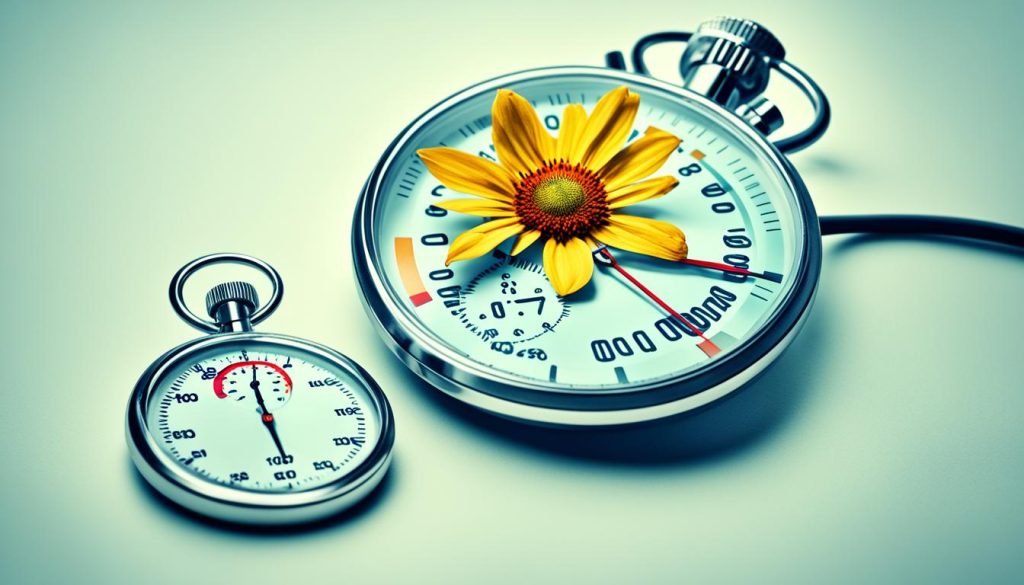Ad Blocker Detected
Our website is made possible by displaying online advertisements to our visitors. Please consider supporting us by disabling your ad blocker.
You’ve probably heard about testosterone’s vital role in men’s health, but did you know that low levels of this hormone might be playing a role in your sexual performance? Many men struggling with low testosterone treatment for premature ejaculation often overlook the significant connection between testosterone and ejaculation. It’s not just about libido or muscle mass; testosterone is crucial for overall sexual health.
Picture this: you’re in an intimate moment, but things escalate quicker than expected. It’s not uncommon, and you’re not alone. The effects of low testosterone on sexual health often manifest in unexpected ways, including a direct impact on your control during these private encounters. Let’s delve into this sensitive topic and shed light on the plight you or your partner may be facing in the bedroom.
Key Takeaways
- Understanding the role of testosterone may help you manage premature ejaculation.
- The connection between testosterone and ejaculation is complex but significant.
- Testosterone levels below 300 ng/dL could influence your sexual health and satisfaction.
- Chronic conditions, obesity, and stress can contribute to low T and sexual health issues.
- Exploring medical and behavioral treatments can improve both testosterone levels and ejaculation control.
- Low testosterone treatment for premature ejaculation can enhance overall well-being and quality of life.
Understanding Low Testosterone and Its Impact on Men’s Health
As you navigate the complexities of men’s health, it’s crucial to consider how certain hormonal imbalances, such as low testosterone, can influence overall well-being. Known medically as hypogonadism, this condition extends beyond the gym and the bedroom, underscoring the profound influence testosterone has on a range of physical and mental health aspects.
What Is Low Testosterone?
Low testosterone, or hypogonadism, is defined by an inadequate production of the hormone testosterone, which plays a vital role in a range of bodily functions from muscle mass and bone density to sexual reproduction and mood regulation. When levels drop below the norm, it can lead to various health concerns, including the hormonal causes of premature ejaculation, a frustrating condition that affects countless men.
Who Does Low Testosterone Affect?
Low testosterone isn’t selective; it can impact anyone. However, certain groups are more prone, particularly older men and those battling with obesity or chronic conditions like diabetes. Men living with HIV/AIDS also face a higher risk of experiencing low T.
How Can Low Testosterone Affect Quality of Life?
The impact of low testosterone on quality of life can’t be overstated. This hormone is essential for maintaining vitality and vigor, and when deficient, it is known to cause testosterone deficiency and premature ejaculation, among other health challenges. Men may experience a decrease in muscle strength, a sense of fatigue, and mental health struggles against the backdrop of depression.
Sexual health, heavily reliant on adequate testosterone levels, is often one of the first areas where men notice a problem. Reduced sexual desire, or a waning libido, and difficulty in maintaining or achieving an erection, a condition often referred to as erectile dysfunction, are clear-cut signs of low T. Moreover, the ability to control ejaculation ties back to testosterone levels and ejaculation control, underscoring the significance of hormonal balance in sexual performance and satisfaction.

If you’re facing such symptoms, it’s important to reach out to a healthcare professional who can guide you through the process of diagnosis and treatment, potentially averting a decline in your quality of life due to low testosterone. Rest assured, you’re not alone, and there are effective strategies and treatments that can address these issues.
Can Low Testosterone Cause Premature Ejaculation
If you’re grappling with concerns around sexual health, particularly premature ejaculation, you might be curious about the role your hormones play. It’s a widespread question: can low testosterone cause premature ejaculation? The answer isn’t straightforward, but understanding the connection may help in addressing this sensitive issue.
Research hints at an intricate link between low testosterone levels and the likelihood of experiencing premature ejaculation. While low testosterone, on its own, may not be a direct cause, it influences other conditions, such as erectile dysfunction (ED), that can make it challenging to maintain control during sexual interactions. Testosterone therapy for premature ejaculation has been studied as a potential treatment, offering a glimmer of hope for those affected.

The effects of low testosterone on sexual health can be far-reaching, often contributing to increased stress and anxiety levels. This psychological burden alone can exacerbate the situation, potentially leading to a cycle of decreasing testosterone levels and increasing sexual dissatisfaction and performance anxiety.
| Sexual Health Concern | Connection to Low Testosterone | Potential Treatment Approach |
|---|---|---|
| Premature Ejaculation | Indirectly linked; may result from associated ED influenced by low testosterone | Lifestyle changes, counseling, and in some cases, testosterone therapy |
| Erectile Dysfunction | Directly associated with low testosterone levels | Medications (e.g., PDE5 inhibitors), testosterone therapy, lifestyle modifications |
| Decreased Libido | Common effect of low testosterone; reduces sexual desire | Testosterone therapy, psychological support |
It’s also worth noting that various factors, including hormonal imbalances, can influence both testosterone levels and the control of ejaculation. So if you’re experiencing difficulties, it’s essential to consider the full spectrum of your health. Chronic conditions and general stress can both act as catalysts for these sexual challenges.
The Effects of Low Testosterone on Sexual Health and Performance
Testosterone’s role in sexual health is significant; it’s a cornerstone for maintaining both erectile function and libido. When you are faced with the issue of low testosterone, your sexual performance may not live up to your expectations, which can be quite distressing and impactful on your relationships.
Hormonal Influences on Erectile Function and Libido
A decline in testosterone levels doesn’t just affect muscle mass and mood, but it also deeply influences sexual functions. Effects of low testosterone on sexual health might lead to erectile dysfunction (ED), which is a hindrance in achieving or maintaining an erection necessary for sexual satisfaction. This hormonal insufficiency can also turn your once lively libido listless, impacting intimacy and self-confidence.
Testosterone Levels and Ejaculation Control
Control over ejaculation is intimately linked with testosterone levels. If you’re struggling with premature ejaculation, understanding that testosterone could play a role is the first step towards managing the situation. Often, it is not only a physical response but a psychological challenge as well, and testosterone therapy for premature ejaculation might be a viable option to consider.

Here is a closer look at how testosterone impacts two critical aspects of male sexual health:
| Aspect of Sexual Health | Effects of Normal Testosterone Levels | Effects of Low Testosterone Levels |
|---|---|---|
| Erectile Function | Aids in achieving and sustaining erections | May contribute to the onset of erectile dysfunction |
| Libido | Enhances sexual desire and arousal | Can cause a reduced interest in sexual activity |
| Ejaculation Control | Supports proper functioning of muscles involved in ejaculation | Might lead to premature ejaculation or difficulty reaching climax |
It’s crucial to recognize the relationship between testosterone and premature ejaculation, as well as how testosterone therapy for premature ejaculation may hold the key to enhancing sexual performance. Don’t hesitate to seek medical advice if you suspect low testosterone might be affecting your sex life.
Treatments and Strategies for Managing Low Testosterone and Premature Ejaculation
When it comes to low testosterone treatment for premature ejaculation, your options are diverse and can be tailored to meet your specific needs. An individualized approach, combining medical interventions with lifestyle adjustments and psychological support, is the most effective way to address these concerns.
Low Testosterone Treatment Options
One of the primary methods for managing low testosterone is through testosterone replacement therapy (TRT). TRT is designed to restore your testosterone levels to a normal range, which could also alleviate symptoms of premature ejaculation. However, deciding if TRT is right for you should include a discussion with your healthcare provider about the potential benefits and risks.
Complementary to TRT, adopting a healthier lifestyle may significantly boost your overall well-being and testosterone levels. This includes:
- Regular physical activity, especially strength training and aerobic exercises
- A balanced diet rich in nutrients
- Maintaining a healthy weight
- Avoiding tobacco use and limiting alcohol intake
These steps not only help in managing low testosterone but can also contribute to enhanced sexual performance and stamina.
Behavioral and Psychological Approaches to Premature Ejaculation
Alongside medical interventions, behavioral approaches to premature ejaculation are valuable techniques that can offer immediate relief. Behavioral strategies such as:
- Masturbating an hour or two before intercourse to delay ejaculation during sex
- Using thicker condoms to decrease sensitivity and extend the duration of intercourse
- Practicing deep breathing exercises to reduce the rapid pace of arousal
- Experimenting with sexual positions that reduce penile sensitivity and enhance control
are all actionable measures you can take.
Additionally, psychological counseling can aid in managing any emotional or relationship issues that may contribute to premature ejaculation. This is particularly beneficial when feelings of anxiety, depression, or stress are at the heart of the problem.
If behavioral and psychological interventions are not enough, talk to your doctor about other medical options. Specific medications can be prescribed to delay ejaculation or treat any underlying conditions influencing your sexual health.
| Treatment | Description | Benefits |
|---|---|---|
| Testosterone Replacement Therapy | Medical treatment to increase testosterone levels | Improves libido and may reduce premature ejaculation |
| Lifestyle Changes | Including exercise, diet, and avoiding negative habits | Boosts overall health and testosterone production |
| Behavioral Techniques | Strategies to delay ejaculation | Offers immediate control over arousal and ejaculation |
| Psychological Counseling | Addressing underlying emotional issues | Improves mental well-being and sexual performance |
| Medications | Prescription drugs to delay ejaculation | Provides a direct approach to managing premature ejaculation |
Remember that overcoming low testosterone and premature ejaculation may take time, and sometimes a combination of treatments is the key to success. Always consult with your healthcare provider before embarking on any treatment plan.

Conclusion
Decoding the intricate connection between testosterone and ejaculation is more than a quest for sexual fulfillment; it is a commitment to bolstering your overall health. The realization that low testosterone levels may not directly trigger premature ejaculation but certainly hold sway in this private arena can be transformative. A deficiency in this key hormone bears the weight of muted desires and a dampened erectile function, complicating your journey towards sexual satisfaction.
It’s heartening to know that the remedy lies not just in medical intervention, such as hormone replacement, but also in the power of testosterone levels and ejaculation control through lifestyle tweaks. You are not alone in this, and practical modifications to your daily routine, combined with expert advice, can brighten the outlook significantly. Moreover, the path to reclaiming your sexual prowess is lined with behavioral strategies that promise to return the command into your hands.
In shedding light on testosterone deficiency and premature ejaculation, it’s clear that one’s intimate wellbeing is hinged on multiple factors beyond just chemistry. By tackling stress, scrutinizing chronic health nuisances, and nurturing a stronger sense of self, you lay the groundwork for breaking the cycle of symptoms that may be plaguing your sexual health. Embrace the comprehensive solutions at hand, and you’re well on your way to rediscovering a more gratifying and confident intimate life.
FAQ
What is the connection between low testosterone and premature ejaculation?
While low testosterone does not directly cause premature ejaculation, it can contribute to the condition by affecting erectile function, libido, and overall psychological well-being, which in turn may impact ejaculation control.
What is low testosterone, and how does it impact men’s health?
Low testosterone, also known as hypogonadism, means the body is not producing sufficient testosterone. This can lead to various health issues such as weak bones, decreased muscle strength, fatigue, depression, low libido, and erectile dysfunction, which affects a man’s overall quality of life.
Who is most likely to be affected by low testosterone?
Men who are older, overweight, or living with chronic diseases, as well as those affected by conditions such as HIV/AIDS, are more susceptible to having low testosterone levels.
How can low testosterone levels affect a man’s quality of life?
Low testosterone can lead to reduced sexual desire, erectile dysfunction, mood disturbances, decreased muscle mass, and a lower sense of well-being, severely impacting a man’s quality of life.
Can testosterone replacement therapy help with premature ejaculation?
Testosterone replacement therapy can help normalize testosterone levels, which might indirectly help with premature ejaculation by improving erectile function and reducing the psychological stress associated with sexual performance.
What are the effects of low testosterone on erectile function and libido?
Low testosterone levels can lead to erectile dysfunction, characterized by the inability to achieve or maintain an erection, and can also reduce sexual desire, or libido, both of which affect sexual performance.
How do testosterone levels control ejaculation?
Normal testosterone levels assist in muscle contractions in the prostate and the widening of the urethra during ejaculation, potentially leading to better ejaculation control. Low testosterone may impact these processes and thus affect control over ejaculation.
What treatment options are available for low testosterone?
Treatment options for low testosterone include testosterone replacement therapy, lifestyle changes like diet and exercise, and addressing underlying health issues. It’s important to consult a healthcare provider for a personalized treatment plan.
What behavioral and psychological approaches can help manage premature ejaculation?
Behavioral techniques like the “stop-start” method, masturbating an hour or two before intercourse, deep breathing to delay ejaculation, and using thicker condoms to reduce sensation can help. Psychological therapies, such as counseling or sex therapy, are also effective in managing premature ejaculation.
Is There a Direct Link Between Low Testosterone and Premature Ejaculation?
Many studies have explored the potential connection between low testosterone levels and premature ejaculation. While there is evidence to suggest that testosterone may play a role in sexual functioning, the specific effects of testosterone on ejaculation levels are still not fully understood.


